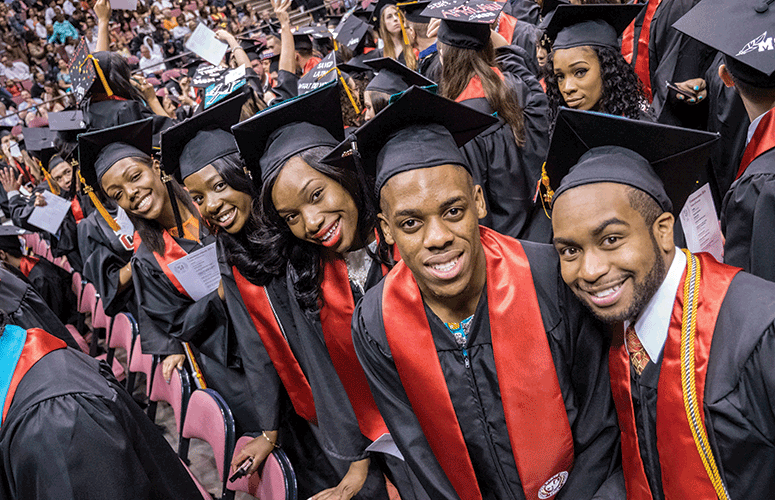
Opportunities for the Underserved
Higher education and healthcare institutions give Newark residents a chance to succeed and stay healthy.
By Lisa Goulian Twiste, Contributing Writer On Sep 10, 2021At the end of March, Newark officials announced the launch of the Newark Equitable Vaccine Initiative, a community driven campaign to distribute the COVID-19 vaccine to more of the city’s underserved residents. The fact that Newark was one of just seven cities across the US selected for this pilot program – part of The Rockefeller Foundation’s $20-million initiative to increase vaccination rates among communities of color – was no accident.
Newark has long been a shining example of how a city’s leaders can promote equity for underserved communities – whether it be about access to medical care, food, housing or educational opportunities. This commitment extends from health and education institutions all the way up to the mayor’s office, which recently announced the Newark Movement for Economic Equity, a program that will pay $12,000 over a two-year period to 400 Newark residents with household incomes 200% below the federal poverty level and who were financially impacted by the COVID-19 pandemic.
“We must emerge from the COVID-19 pandemic with new purpose, new vision and new ideas to transform our community and truly improve the quality of life of our residents,” Mayor Ras J. Baraka said during the program’s May 10 launch. “Here, we have an opportunity to directly empower and strengthen hundreds of lives immediately, while also demonstrating how to do so to the entire nation.”
NEWARK’S MEDICAL COMMUNITY STEPS UP
Many of the programs promoting equity come from the medical community. In May, the Lown Institute named Newark Beth Israel Medical Center one of nation’s 10 most racially inclusive healthcare facilities, and the hospital recently promoted Atiya Jaha-Rashidi to the newly created position of Chief Equity Officer, where her role is to foster equity in hiring, policies, procedures, leadership and governing, while also continuing to develop strong community partnerships.
“In order for us to reduce health disparities, we needed a cabinet level leader who sits in on every management team meeting, looking at things through the lens of equity,” says Darrell K. Terry, Sr., Newark Beth Israel’s president and chief executive officer. “We also have an equity assessment tool, and if we’re making a change or creating new programs, we use this tool when considering how this is going to impact the communities we serve.”
The hospital is also working to reduce maternal mortality – which is higher in Black and Latino populations – making sure women have access to quality pre-natal and post-natal care with a special focus on treating hypertension, or preeclampsia. These patients are being sent home with equipment to take their own blood pressure, while also receiving additional appointments and follow-up calls from physicians.
Strides in recent years also include an increasing number of Black and Latino students entering the Newark Beth Israel residency program and more Black and Latino applicants for director positions or above, Terry says, adding, “We don’t even interview for open positions without making sure we’ve sourced diverse candidates. We want to make sure the leadership team reflects our community.”
At Saint Michael’s Medical Center, the institution reflects the Newark community it serves, according to CEO Dr. Alan Sickles. “We feel like the community and we look like the community. Many of our employees were born in Newark and live here.”
A teaching affiliate of New York Medical College, St. Michael’s offers residencies in internal medicine and podiatry, as well as fellowships in cardiology, gastroenterology, hematology/oncology and infectious disease. Sickles says the hospital encourages its residents and fellows to stay in Newark once they complete their graduate medical education.
He adds that the hospital “serves as an urban safety net for our neighborhood and we are here for the community in every way – serving as the family doctor and the front door for medicine.”
Last year, after the murder of George Floyd, St. Michael’s held a vigil organized by Chief Medical Officer Dr. Hamid Shaaban in the institution’s central courtyard with more than 100 employees attending. They observed eight minutes of silence while kneeling. “This, along with events like drives to support organ donation and the way we’ve cared for COVID patients, are real examples of how we as a hospital staff strive to be culturally sensitive and socially conscious,” Sickels explains.
At the same time, Newark-based University Hospital, the state’s public academic health center and principal teaching hospital for Rutgers New Jersey Medical School, regularly coordinates health fairs that provide screening for diabetes, hypertension, eye and dental exams, while also helping arrange primary and specialty care visits for high-risk patients who have missed regular appointments due to COVID.
Beginning last year, the hospital collaborated with the City of Newark Department of Health and Community Wellness and other stakeholders to complete a Community Health Needs Assessment (CHNA), interviewing several marginalized and historically excluded groups – the disabled, people with substance abuse issues, the undocumented, those without homes, and members of the LGBTQIA community, among others – to recognize healthcare needs and socioeconomic challenges in Newark and beyond.
“To transform and revitalize neighborhoods and communities, you need to begin with transformed people,” says Chris Pernell, MD, MPH, University Hospital’s chief strategic integration and health equity officer. “Providing care that is tailored to the social, cultural and health needs of the population is at the forefront of our mission and strategy for the future. It’s also how we advance health equity at the individual, population and systemic levels.”
STEPPING UP CARE TO DIVERSE COMMUNITIES
COVID-19 brought many issues into sharp focus, both in terms of how the pandemic has affected communities of color, and the rate at which these communities are being vaccinated compared to communities at large. When Newark Beth Israel saw a notable discrepancy in the vaccination rates of physicians vs. service-oriented staff – the latter of which has a higher percentage of Blacks and Latinos – Terry himself met with them and brought in physicians to address their concerns. This ultimately raised the number of vaccinated service-oriented hospital workers from 25% to 60%, he says.
At the same time, University Hospital, along with the New Jersey Department of Health, is using Mobile Command Center (MCC) buses and a Rapid Mobile Response Team to bring vaccines to neighborhoods with the lowest vaccination rates or the most COVID-19 cases. The hospital is also using Community Health Worker-model programs to identify the social determinants of health that are barriers to its patient population, addressing pressing needs such as food, primary care, transportation, and employment.
“Without this added step of intervention, individuals may not receive the assistance needed to navigate available resources,” Pernell says. “Furthermore, screening for social determinants of health is an important first step in addressing the major causes of poor health and healthcare outcomes in vulnerable patients.”
NEW HOUSING & HEALTHIER CITIZENS
In another move to promote health equity, RWJBarnabas Health partnered with Pennrose, LLC, the City of Newark, and the New Jersey Housing and Mortgage Finance Agency (NJHMFA) on a $25.7-million project to create approximately 70 affordable rental apartments in Newark’s South Ward – just two blocks from Newark Beth Israel.
Similarly, the Murphy Administration announced in May that University Hospital has teamed with the NJHMFA and L & M Development Partners to propose a plan for affordable residential units atop an 8,000-square-foot medical facility with medical services as well as community space for health education, workforce training and more. The facility will set aside 16 units for tenants with a history of homelessness and reliance on University Hospital’s emergency department for primary healthcare.
“At University Hospital, we consider housing to be among the most critical determinants of health and well-being,” Pernell says. “By providing supportive housing units to eligible patients with complex social, behavioral, mental and physical health histories, we will be able to direct those persons towards a healthier, more stable trajectory and path.”
HIGHER ED INSTITUTIONS AIDING THE UNDERSERVED IN NEWARK
Newark is also making great strides in opening up higher education opportunities to its residents. For example, the Newark City of Learning Collaborative (NCLC), comprised of partners from community-based organizations, local government, foundations, corporations, K-12 schools and higher education, is working to increase the number of residents going on to attain post-secondary degrees or credentials – not only high school students, but older adults interested in completing two- or four-year programs or an industry-recognized credential.
“NCLC has the opportunity to address challenges and identify best practices and opportunities for families and aspiring students by giving them access to tools, resources and supports they need to apply to these programs,” says Robyn Ince, NCLC’s executive director and an assistant professor of professional practice, Department of Urban Education at Rutgers University-Newark, one of nine area colleges and universities on the NCLC advisory board.
New Jersey Institute of Technology (NJIT), a top 20 national university for producing Black and Latino engineers, is working to attract more diverse candidates to STEM fields while also doubling the number of Newark students enrolled at the institute, according to Matthew Golden, Ed.D., chief strategy officer, Office of Strategic Initiatives. The Center for Pre-College Programs works annually with some 4,300 pre-college students who are predominantly Black and Latino students and young women from the greater Newark area – with about 200 enrolling as undergraduates at NJIT each fall.
Pillar College has several programs aimed at more inclusivity for Black and Latino students, which make up about 90% of the student body. These include the LEAD (Life Enhancing Accelerated Degree), which is aimed at students 25 and older with a minimum of 48 college credits who can earn a bachelor’s degree in two years (750 people have graduated from the program since its inception in 2012); DEED, a Dual Enrollment Education Program in which students can finish high school while earning college credits; and Programa BLEND, a bi-lingual program that allows Spanish-speaking students to take courses in Spanish during their first two years while also studying English as a Second Language and working toward their associate degree and then going on to their bachelor’s degree.
Pillar College is also trying to address the shortage of teachers in the Newark public school system with a recently established Elementary Education degree program. President David E. Schroeder, Ed.D., says his staff is working with leaders at community colleges to recruit students – Black males, in particular – who have completed their associate program successfully and want to continue in that field.
“Studies show conclusively that students – whether boys or girls – benefit tremendously from having African-American male elementary teachers,” he says. “They have much greater success in going on to college and establishing themselves in good careers. So, if an African-American male comes into the program with an interest in becoming an elementary school teacher, they basically have a full ride.”
Another effort comes from the Center for Urban Entrepreneurship and Economic Development (CUEED) at Rutgers Business School, which was founded in 2009 and has since worked with some 600 entrepreneurs on strategic planning, marketing and other advisory services. Over the last two years, CUEED has also been helping connect these entrepreneurs to capital through federal grants; an angel investment group of alumni, and others in the community; and the Black Entrepreneurs Survive and Thrive (BEST) Fund, which was started during the pandemic to provide 0% loans of $25,000 to $50,000 to Black-owned businesses.
The CUEED angel fund is focused on growth businesses, a lot of which are tech or tech enabled. According to Executive Director Lyneir Richardson, most of the entrepreneurs CUEED works with own “everyday” businesses. More than 70% of these business owners are Black or Latino; 40% are based in Newark or adjacent communities; and more than 200 generate over $1 million a year.
“My goal at CUEED is that when someone establishes that they have a solid business idea, we can put in the first $25,000 to $50,000 to get it off the ground,” Richardson says. “Black and Latino entrepreneurs need that early seed stage capital because of all the systemic inequality that’s been in America.”
Essex County College has also continued to provide accessible and affordable quality educational services to the community – especially Newark residents, according to Dr. Augustine A. Boakye, the institution’s interim president.
“Throughout the COVID-19 pandemic, the college has supported students with loaner laptops and accessories, free internet hotspots, and one-on-one tutoring to support our students’ academic journeys,” Boakye says. “In partnership with Essex County Executive Joseph N. DiVincenzo, we are also a COVID testing and vaccination site for students, faculty, staff and the community. Additionally, our Child Development Center serves as a safe place for many parents who need childcare assistance.”
Essex County College also provides free tuition to qualifying students through the state’s Community College Opportunity Grant. Eligible students receive financial support as well. In an effort to help combat food insecurity, the college also expanded its food pantry program.
Meanwhile, Berkeley College’s work toward equity for its students, whether at its Newark campus or elsewhere in the state, encompasses an education that is grounded in diversity, inclusion, experiential learning for entrepreneurs and professionals in healthcare, law enforcement, social justice, data science, design and a host of other fields.
According to Berkeley President Michael J. Smith, “Through our relationships with employers and community partnerships, our goal is to always establish a seat at the table of equity and opportunity for our students. This includes providing academic resources and other supports, such as a food pantry at our Newark campus for students who face food insecurity, and a career clothing boutique that provides free professional clothing to students for job interviews, internships and career placements. These resources are possible because of collaborations with nonprofit organizations such as the Community Food Bank of New Jersey, and private industry partners such as Investors Bank.”
To access more business news, visit NJB News Now.






